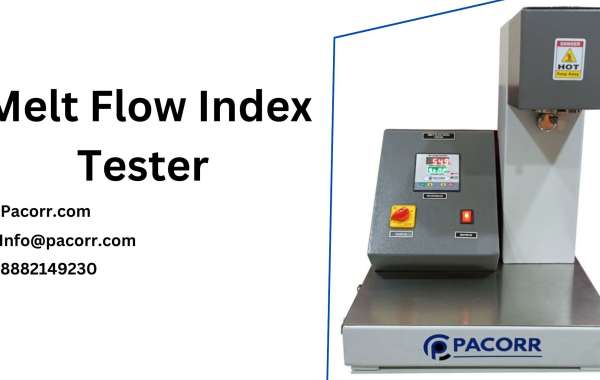What is a Melt Flow Index Tester?
A Melt Flow Index Tester is a precision instrument used to measure the melt flow rate of thermoplastic polymers. The Melt Flow Index Testing is an indicator of the ease of flow of a polymer melt and is typically expressed in grams per 10 minutes. This value helps in determining the viscosity of the material under specific conditions of temperature and load, making it a critical factor in understanding the behavior of plastics during processing.
How Does a Melt Flow Index Tester Work?
The Melt Flow Index Tester operates by heating a sample of the polymer to a specific temperature until it melts. The molten polymer is then extruded through a small die under a standardized weight. The rate at which the material flows through the die is measured, providing the MFR value. This process simulates the conditions a polymer might experience during manufacturing processes like injection molding or extrusion, allowing for accurate predictions of how the material will behave.
Why is the Melt Flow Index Important?
The MFI is a crucial parameter in the quality control of thermoplastics. It provides insights into the polymer's molecular weight and the extent of its polymerization, both of which significantly impact the material's properties and processing characteristics. A higher MFR indicates a lower molecular weight and, consequently, a material that flows more easily, which might be desirable or undesirable depending on the application.
For manufacturers, understanding the Melt Flow Index Tester Price of a material can help in selecting the appropriate processing conditions and ensuring that the final product meets the required specifications. Additionally, it aids in maintaining consistency across production batches, which is essential for delivering products that meet customer expectations.
Applications of Melt Flow Index Testing
- Quality Control in Manufacturing: Manufacturers use MFI testing to ensure that raw materials meet the necessary standards before being used in production. This prevents issues related to processing difficulties and product defects.
- Research and Development: In R&D, the MFI Tester is used to study the effects of different additives or processing conditions on a polymer’s flow properties. This information is vital for developing new materials with desired characteristics.
- Regulatory Compliance: Many industries have specific regulations regarding the materials used in products, particularly in sectors like automotive, medical devices, and food packaging. MFI testing ensures compliance with these standards.
Choosing the Right Melt Flow Index Tester
When selecting an MFI Tester, it’s important to consider factors such as accuracy, repeatability, ease of use, and the specific needs of your application. Pacorr offers a range of Melt Flow Teste that cater to various industrial requirements. These instruments are designed to provide precise measurements, ensuring that your materials are tested to the highest standards.
Conclusion
In the world of polymer and plastic testing, the Melt Flow Index Tester is an indispensable tool. It not only helps in ensuring the quality and consistency of materials but also plays a crucial role in the research and development of new products. Whether you're involved in manufacturing, R&D, or quality control, understanding and utilizing MFI testing is key to achieving superior product performance and compliance.
Visit Pacorr.com to explore our range of Melt Flow Index Testers and other testing equipment designed to meet your industrial needs.







